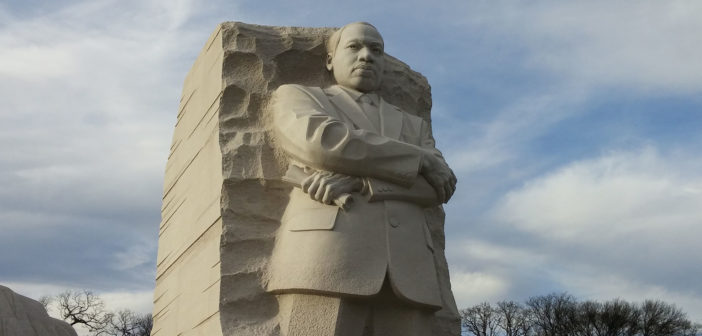C. Anthony Hunt explains how Martin Luther King Jr.’s prophetic witness was grounded in four principles—call, conviction, courage, and commitment. Even 50 years after King’s assassination, these principles are still relevant to leaders engaging in prophetic witness and public ministry.
Este artículo está disponible en español. — This article is available in Spanish.
This article was originally published on January 10, 2018.
Dr. Martin Luther King Jr. believed that God intended for the human family to live in community as interrelated members. He saw the Christian love-ethic as foundational in moving forward constructively toward the realization of this authentic community—his Beloved Community. And he saw the struggle to eradicate racial hatred and economic oppression as not just a moral imperative but also as a divine imperative for both church and society. His prophetic leadership was grounded in four key principles—call, conviction, courage and commitment—that still have great relevance to leaders today engaging in prophetic witness and public ministry.
Call
King’s 13-year ministry in the public sphere was ultimately rooted in a deep sense of God’s call. And it was this sense of calling that ultimately spawned his action. Early in his ministry, King concluded that becoming one of the prophetic public voices of the Civil Rights movement was indeed a part of his vocation and calling—first in Alabama and then beyond. Likewise, leaders today must clearly discern if and how they may be called by God to engage in public ministry and address prophetic concerns.
Conviction
King acted on his sense of calling within the broader context of his understanding of God and people. King believed that all persons were created by God with inherent worth. Accordingly, human dignity and social justice for all are moral imperatives. King consistently affirmed the “Somebodyness” of all people regardless of race, class or other categories. Ultimately, these faith convictions undergirded his prophetic witness. Likewise, leaders today engaging in ministry in the public square must be equally clear about their convictions—what they believe about God, God’s people, and God’s will for peace with justice.
Courage
Courage serves as the measure of the human will to act on our call and convictions – to say and do what we believe to be just and right. Interestingly, Martin Luther King Jr. carried with him Paul Tillich’s The Courage to Be as he traveled, providing leadership to the Civil Rights movement. Courage to act on one’s call and convictions means being willing to risk much of oneself—one’s popularity, promotion and associations—for the sake of causes you are called and convicted to address prophetically.
Commitment
In 1955 and 1956, in the midst of the 381-day Montgomery Bus Boycott, King made a statement that became emblematic of his prophetic witness. “True peace is not merely the absence of tension; it is the presence of justice.” He would later state that, “The arc of the moral universe is long, but it bends toward justice.” These statements speak clearly to King’s commitment to promote racial equality and social justice, to eradicate the “triplets of evil” of racism, poverty and war, and to help move the church and society toward becoming Beloved Community.
Martin Luther King Jr.’s commitment to do justice was derived from his sense of calling, conviction and courage. Today as well, prophetic leadership requires clear and consistent commitment in light of the calling and conviction to do justice, and the courage to carry it out.
This article is adapted from “I’ve Seen the Promised Land: The Legacy of Martin Luther King, Jr. and Prophetic Preaching” in Stones of Hope: Essays, Sermons and Prayers on Religion and Race, 2017, by C. Anthony Hunt. Available at Amazon.
Related Resources:
- Moving Faith Communities to Fruitful Conversations about Race, a free video study
- Ten Ways to Build the Beloved Community by Tony Hunt
- Nelson Mandela — A Leader for His Time by Lovett H. Weems Jr.
If you would like to share this article in your newsletter or other publication, please review our reprint guidelines.







